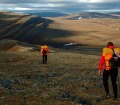The muscles in the feet play a central role in stability, balance, and mobility. Unfortunately, they are often neglected due to modern shoes. Barefoot shoes offer a way to reactivate and strengthen these muscles.
The Anatomy of the Foot
Structure of Foot Muscles The human foot consists of 26 bones, 33 joints, and over 100 muscles, tendons, and ligaments. This complex structure allows us to walk, run, and maintain balance. The muscles in the foot are divided into two main categories: intrinsic and extrinsic muscles.
- Intrinsic muscles: These are located directly in the foot and are responsible for fine motor skills and maintaining the arch of the foot.
- Extrinsic muscles: These extend from the lower leg into the foot and help with foot movement, such as toe lifting or plantar flexion.
The Role of Foot Muscles in Daily Life
Foot muscles are essential for every movement we make. Whether walking, running, or standing, these muscles provide stability and balance. Weak muscles can lead to foot problems like flat feet, plantar fasciitis, and even knee and back issues.
Benefits of Barefoot Shoes
Promoting Natural Foot Movement
Traditional shoes often restrict foot mobility and cause certain muscles to become underused. Barefoot shoes encourage the natural movement of the foot and allow for greater freedom of motion.
Improving Foot Musculature
Due to the reduced cushioning in barefoot shoes, the foot must work harder to maintain stability. Over time, this strengthens the foot muscles, which in turn reduces the risk of injury.
Injury Prevention by Strengthening Feet
Stronger feet are less prone to injuries. By training and strengthening foot muscles, issues like overpronation or supination can be reduced. This can also decrease stress on other joints, such as the knees and hips.
How Barefoot Shoes Strengthen Foot Muscles
Difference Between Traditional Shoes and Barefoot Shoes
While traditional shoes often come with thick soles and arch support, barefoot shoes offer the opposite. They are extremely flat, with thin soles and no additional support. This forces the feet to rely more on their own muscle strength.
Training Effects on Foot Muscles
Wearing barefoot shoes is comparable to continuous training for the feet. Similar to workouts at the gym, where specific muscle groups are targeted, barefoot shoes activate the deeper muscles in the foot that are less engaged when wearing traditional shoes.
Transitioning to Barefoot Shoes
Tips for Beginners
The switch to barefoot shoes should be gradual. Since the foot muscles are not accustomed to the new demands, transitioning too quickly can lead to soreness or even injury. Start with short wearing periods and gradually increase them.
Common Mistakes When Switching to Barefoot Shoes
Many people make the mistake of wearing barefoot shoes all day right away. This can lead to overuse injuries, especially if the feet are used to highly supportive shoes. It’s important to give your body time to adjust.
Foot Exercises to Strengthen Muscles
Simple Exercises to Do at Home
There are many exercises that can help strengthen foot muscles, such as:
- Toe gripping: Try picking up objects like a towel with your toes.
- Single-leg stand: Stand on one leg to train balance and foot muscles.
Mobility and Stretching Exercises
In addition to strengthening exercises, it’s important to keep the feet mobile and flexible. Stretching exercises, such as rolling a tennis ball under the foot, can help.
Barefoot Shoes in Everyday Life
How to Integrate Barefoot Shoes into Daily Life
Barefoot shoes can be worn in many everyday situations, whether for walking, shopping, or even at work. The key is to gradually get used to them and avoid overloading the feet.
User Experiences
Many users report improved foot strength and fewer discomforts in daily life after a transition period with barefoot shoes.













